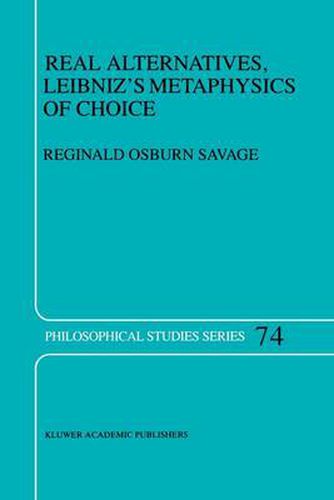Readings Newsletter
Become a Readings Member to make your shopping experience even easier.
Sign in or sign up for free!
You’re not far away from qualifying for FREE standard shipping within Australia
You’ve qualified for FREE standard shipping within Australia
The cart is loading…






This title is printed to order. This book may have been self-published. If so, we cannot guarantee the quality of the content. In the main most books will have gone through the editing process however some may not. We therefore suggest that you be aware of this before ordering this book. If in doubt check either the author or publisher’s details as we are unable to accept any returns unless they are faulty. Please contact us if you have any questions.
In the Preliminary Dissertation of his theodicy, Leibniz declares himself an apologist for the compatibilist doctrines of original sin, election and reprobation propounded by the theologians of the Augsburg Confession. According to those theologians, man’s actions are determined but man retains the power to act otherwise and therefore is responsible for his actions. Savage argues that Leibniz, in formulating his apology, availed himself of both his doctrine of possible worlds and his finite-infinite analysis distinction (the latter being applied within the former). Savage challenges the dogma that Leibniz’s metaphysical principles entail that individuals are powerless to act otherwise and that God cannot conceive of them acting otherwise. He argues that interpreters deduce the dogma from those principles with the aid of dubious extra-textual premises, for example, that a Leibnizian individual has only one complete concept or cannot be persons other than the person it actually is.
$9.00 standard shipping within Australia
FREE standard shipping within Australia for orders over $100.00
Express & International shipping calculated at checkout
This title is printed to order. This book may have been self-published. If so, we cannot guarantee the quality of the content. In the main most books will have gone through the editing process however some may not. We therefore suggest that you be aware of this before ordering this book. If in doubt check either the author or publisher’s details as we are unable to accept any returns unless they are faulty. Please contact us if you have any questions.
In the Preliminary Dissertation of his theodicy, Leibniz declares himself an apologist for the compatibilist doctrines of original sin, election and reprobation propounded by the theologians of the Augsburg Confession. According to those theologians, man’s actions are determined but man retains the power to act otherwise and therefore is responsible for his actions. Savage argues that Leibniz, in formulating his apology, availed himself of both his doctrine of possible worlds and his finite-infinite analysis distinction (the latter being applied within the former). Savage challenges the dogma that Leibniz’s metaphysical principles entail that individuals are powerless to act otherwise and that God cannot conceive of them acting otherwise. He argues that interpreters deduce the dogma from those principles with the aid of dubious extra-textual premises, for example, that a Leibnizian individual has only one complete concept or cannot be persons other than the person it actually is.